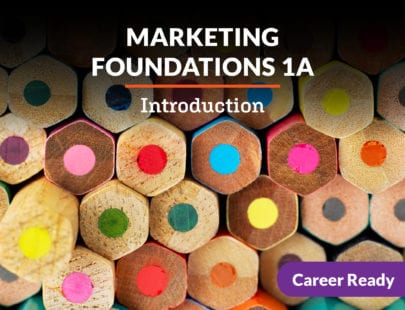
Principles of Business, Marketing, and Finance 1a: Introduction
Discover how leadership, ethics, marketing and advertising, finance and operations management shape businesses through the lens of real-life innovators like Gitanjali Rao and Palmer Luckey. Get hands-on by creating your own brand, Random Acts of Coffee, and see how a socially responsible café operates from the ground up. By the end of the course, you’ll take your first steps towards success by crafting key parts of your own business plan.
Units at a Glance
Unit 1: The Pulse of the Marketplace
On average, 4.7 million new businesses are started in the United States every year. Businesses are created to fulfill human wants and needs. Of course, not every business succeeds. However, those who have stood the test of time have one thing in common—they listen to the pulse of the marketplace and adapt. Keeping up with people’s wants, learning from their mistakes, and always thinking of fresh ideas to stay ahead helps businesses to grow, remain strong, and keep going year after year.
What will you learn in this unit?
- Understand the role of business in fulfilling human wants and needs
- Describe the concepts of supply and demand and their effects on business operations
- Define the stages of the business cycle
- Explain the impact of technology on business operations
Unit 2: Understanding the Business World
From the clothes you wear to your favorite streaming service, every company began with a simple idea and a specific business model. Understanding these models is the first step in building your business, whether you want to sell goods, provide services, or do both. In this unit, you’ll discover how entrepreneurs choose the right business structure for their vision and goals.
What will you learn in this unit?
- Differentiate between types of businesses that market goods and services
- Explore different ownership structures and the factors influencing the choice of business ownership
- Analyze the five factors of production and their role in creating goods and services
- Understand the role of a business plan in supporting a socially responsible company’s mission and values
Unit 3: The People Part of Business
Business leaders must steer their companies through challenges and opportunities to stay on the road to success. However, leadership style is only one part of the equation. The organizational structure a company adopts can also significantly impact its success. On top of that, technology has transformed people’s work, offering more opportunities and challenges.
What will you learn in this unit?
- Analyze different business leadership styles and their impact on organizational culture and success
- Compare different organizational structures and their advantages and disadvantages
- Discuss the role of organized labor and unions in shaping the workforce and their impact on business
- Explain how technology has transformed employment practices and operations
Unit 4: The Mechanics of Making Money
All businesses want to make money. However, they won’t achieve their goals if they can’t sell their products or services. Setting clear sales objectives and knowing how to sell is crucial for budding entrepreneurs who want to steer their ventures toward success. Understanding how pricing strategies and market competition affect sales is important for sustainable growth.
What will you learn in this unit?
- Understand the importance of setting clear sales objectives and the steps of the sales process
- Assess customer needs and present products or services as solutions
- Address customer objections during the selling process
- Understand how to close a sale and the importance of follow-up
- Describe the factors that influence pricing decisions and how competition affects sales strategies
Unit 5: Marketing Functions and Frameworks
Marketing must work side-by-side with every department in a business to achieve business goals. In this unit, you’ll discover how modern marketing adapts to consumer preferences while balancing societal expectations. You’ll explore the psychological factors that influence consumer behavior and how companies incorporate ethical practices into their marketing strategies. Through engaging examples and a breakdown of traditional and digital marketing strategies, you’ll learn how companies tailor their marketing to make a positive impact on society.
What will you learn in this unit?
- Identify and explain the marketing concept and how it influences business strategies to meet consumer demands and societal expectations
- Describe the seven core marketing functions and their role in developing effective marketing strategies to increase customer engagement and drive business performance
- Compare and contrast traditional and digital marketing methods
- Analyze the impact of social responsibility and ethical standards in marketing and how they contribute to trust and long-term customer relationships
Unit 6: Establishing a Financial Foundation
Managing your personal finances is the first step toward understanding how to handle money in a business. Just as you must keep track of your spending and savings, businesses must manage their finances to succeed. In this unit, we’ll explore the basics of financial management. You’ll gain the skills to make smart money choices now and in the future.
What will you learn in this unit?
- Analyze the impact of taxes and other personal deductions on personal income to manage financial expectations and budget effectively
- Evaluate various funding options available for startups and established businesses
- Understand key financial statements that are used to assess a business’s financial health and make informed decisions
- Compare different financial instruments and investment strategies that support sustainable business practices
Unit 7: Decoding the Modern Consumer
Welcome to the fascinating world of the modern consumer. In this unit, you’ll learn all about the digital consumer, discover how businesses have adapted to the digital age, and learn about customer preferences and motivations. We will explore the psychology behind purchasing decisions and uncover how businesses learn about their customers. By the end of this unit, you’ll have a toolkit filled with strategies for understanding and engaging with today’s tech-savvy shoppers.
What will you learn in this unit?
- Explain the importance of understanding customer demographics and preferences
- Compare and contrast traditional and digital consumers
- Analyze the psychological and emotional factors that influence consumer purchasing decisions
- Develop customer personas based on market research and data
Unit 8: Using Data to Make Business Decisions
Get ready to unlock the power of data! In this unit, you’ll discover how big data shapes business strategies and decisions. You’ll explore how businesses get real-time insights, learn about the importance of data privacy and security, and dive into cool trends like artificial intelligence and machine learning. By the end, you’ll know how to use data to make smart decisions and drive the success of your business.
What will you learn in this unit?
- Explain how big data influences business decision making
- Describe how businesses use dashboards for data-driven decision making
- Evaluate privacy and security challenges associated with business data use
- Predict emerging trends in business data use and analysis
Required Materials
Physical
- Calculator
- Video recording device
Software
- Graphic design software
- Presentation software
- Spreadsheet software
- Word processing software
Optional
- Art supplies
- Audio recording device
- Poster board
- Writing supplies



